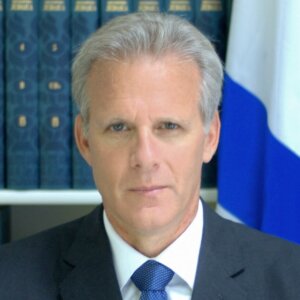‘Our own history will judge us’: Michael Oren on why Israel must take a stand for Ukraine

(R to L) Israel’s incoming Prime Minister Naftali Bennett and Alternate Prime Minister and Foreign Minister Yair Lapid converse together on during an address at the Knesset in Jerusalem on June 13, 2021. By Gil Cohen-Magen/AFP via Getty Images
Supporters of Israel — indeed, Israelis themselves — might be surprised to learn that the country’s policy on Ukraine is virtually the same as that of Iran, Hezbollah and Hamas.
All have refrained from openly condemning Putin. Why would the position of the area’s only Jewish state and its only democracy dovetail with that of a militant theocracy and its terrorist proxies? Why is Israel, like the very forces sworn to destroy it, keeping mum?
It’s easy to understand the positions of Hamas and Hezbollah, both of which procure their armaments from Russia, which has also sold some of the world’s most advanced weapons systems to Iran. Russia has already constructed one Iranian nuclear reactor, at Busheir, and plans to build eight more.
In the Security Council and other international bodies, Moscow has condemned Israel’s efforts to defend itself from these threats and contributed to its delegitimization. Iranian rulers, like the terrorists of Lebanon and Gaza, have every reason to be satisfied with Russia and remain neutral on its attack on Ukraine.
For the same reasons, Israel would have every justification for unequivocally backing Ukraine. And yet, Israeli reactions to the invasion were, in the first week at least, restrained.
Foreign Minister Yair Lapid denounced Russia’s actions as “a violation of the world order,” adding that, “Israel knew many wars” and “war is not the way to solve conflicts.” Not a word was said about Putin and his flagrant aggression.
Prime Minister Naftali Bennett refrained from any criticism at all. “Like everyone else, we pray for peace and calm in Ukraine, and still hope that dialogue will lead to a resolution,” he said. President Isaac Herzog reiterated the theme, saying, “I pray like many in the world for peace to return to this conflict between Russia and Ukraine.”
Common to all three leaders’ remarks was the absence of any willingness to join in Western sanctions against Russia, to support a Security Council resolution condemning the aggression or to supply anything other than humanitarian aid to the Ukrainian resistance.
Such standoffishness was, moreover, widely applauded by the Israeli public. Between one in seven and one in five Israelis — statistics differ — speak Russian, and while many take exception to Putin, many of them share a sense of national and cultural pride.
Ukraine, on the other hand, is remembered as an historical hub of antisemitism, the home of Bohdan Khmelnytsky’s seventeenth-century massacre of Jews and the execution of nearly 34,000 Jews in Babyn Yar in 1941. During the Soviet era, the Ukrainian KGB was especially ruthless in suppressing the Jewish underground and sentenced many of its activists to Siberia.
Then, there is anger at the West in general, and the United States in particular, which many Israelis believe have branded them as colonialists and bankrolled Palestinian extremism. America, many Israelis feel, is determined to renew an Iranian nuclear deal that threatens their safety and perhaps even their survival. America, they claim, is no more an ally than is Russia.
Such factors undoubtedly played a role in the formulation of Israeli policy on Ukraine, but, as in so many other areas, the overriding concern was security. Cooperation with Russian forces in Syria is essential for the IDF’s efforts to thwart Iran’s campaign to transform the country into a border confrontation state and to prevent Hezbollah from receiving Iranian shipments of precision-guided missiles. Through almost daily communications, Israeli and Russian commanders have avoided clashes such as that occurred in 2015, when Turkey shot down a Russian jet fighter. Israel’s military elite is united in opposing any actions, whether in Ukraine or elsewhere, that might upset their quiet understanding with Russia.
Israel’s first responsibility is to the defense of its citizens — so the semiofficial explanation goes — and the world will understand its dilemma. The world will know which side of the conflict Israelis really stand. But will it?
There has been growing criticism of Israel in the US media, including prominent excoriations in both The New York Times and The New Yorker. “Where is Israel on the Ukrainian issue,” wondered former Defense Secretary William Cohen on CNN, “when it says it’s our most important ally in the Middle East?”
But opposition to the government’s policy is rising in Israel as well. Prominent figures such as Natan Sharansky have called on Israel “to take a clear moral stand” and join in solidarity with the free world.
Well-attended pro-Ukrainian rallies have been held in Tel Aviv and larger ones are planned. “Israel is not just any state, Israel is the democratic Jewish state,” I told the Times of Israel on Monday. “I do not believe we can sit by idly while a people led by a proud Zionist Jew — Volodymyr Zelenskyy — fight for their liberty with rifles and Molotov cocktails.”
Shifts in public opinion, combined with pressure from the West, is bringing about a slow but perceptible change in Israel’s stance. In addition to offering to mediate the conflict, Prime Minister Bennett has expanded humanitarian assistance to the Ukrainians. Lapid meanwhile announced Israel’s intention to vote in favor of a UN General Assembly resolution condemning Russia and to set up an interministerial committee to examine Israeli policy toward the sanctions.
In the face of continued Ukrainian resistance, and as reports of civilian casualties mount, Israeli neutrality will become increasingly untenable. On the Ukrainian issue especially, Israel must act not only out of strategic and political interests, but out of Jewish values. And on the Ukrainian issue especially, we must distinguish ourselves from Iran, Hamas, and Hezbollah. Our own history will judge us.
To contact the author, email [email protected].






















